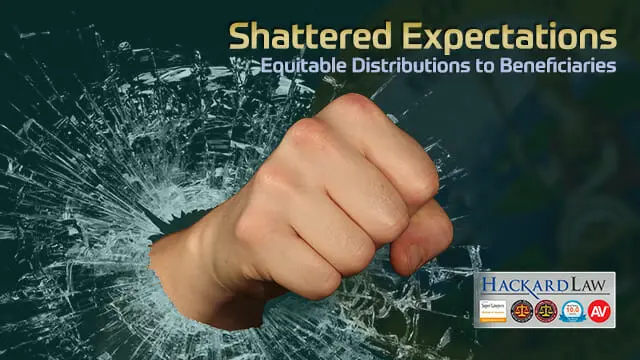
Fair and Equitable Distributions to Trust Beneficiaries | Shattered Expectations
Trust instruments are like a set of instructions. They can be like a clear day or a murky pond. A good set of instructions should be simple, readable and avoid legal jargon. The settlor, the maker of the trust, should work to clearly identify the beneficiaries of his trust, their form of interest (income or principal) and the timing and plan of distribution.
Our law firm often represents trust beneficiaries and disinherited heirs excluded by the action of a wrongdoer. I meet with disinherited heirs and often hear that “mom would have never done that” or “dad always told us that we would be treated equally. We heard that for 30 years.” Our job as trust litigation lawyers is to delve deeper – to look at the trust maker’s capacity and/or their susceptibility to undue influence.
I assume that most people making a trust are inclined to provide for their spouse and children. California’s intestacy rules for people who die without a will reflect the public policy goal of effecting what is statistically likely to be the decedent’s donative intent. In other words, the law does what most people would do in the same circumstances.
Our state’s intestacy rules are pretty simple. If a spouse dies without a will their community property goes to their surviving spouse. If there is separate property the surviving spouse gets all of it if the deceased spouse didn’t have any children. If he had just one child, then the separate property is split equally. If he had two or more children, the surviving spouse gets one-third of the separate property and the children split up the other two-thirds.
So, when a parent lacks capacity or is unduly influenced his trust distribution plan will be closely scrutinized. This is rational. Most children expect pretty much what intestacy laws provide even if they don’t know the law. They carry this expectation even when the intestacy laws don’t apply.
Disinherited children are uniformly shocked by the late trust addition of surprise beneficiaries or the disinheritance of all siblings except one, the one who unduly influenced his parent. These are dashed expectations. I don’t think these expectations are based on greed. They’re expectations commonly understood in our everyday conversations. When the expectations aren’t met we hear comments like “Why did your brother get all of your parents’ estate?” “How did your widowed father disinherit all his kids and leave everything to his caretaker?”
Dashed expectations alone don’t make a case. Trusts made when the maker lacks capacity or is unduly influenced have the makings of the case. There are, of course, more elements. That said if you would like us to hear your story, call us at Hackard Law: 916-313-3030. We represent clients in major cases throughout California’s urban areas, including Sacramento, Santa Clara, Alameda and Los Angeles.

 (916) 775-8542
(916) 775-8542